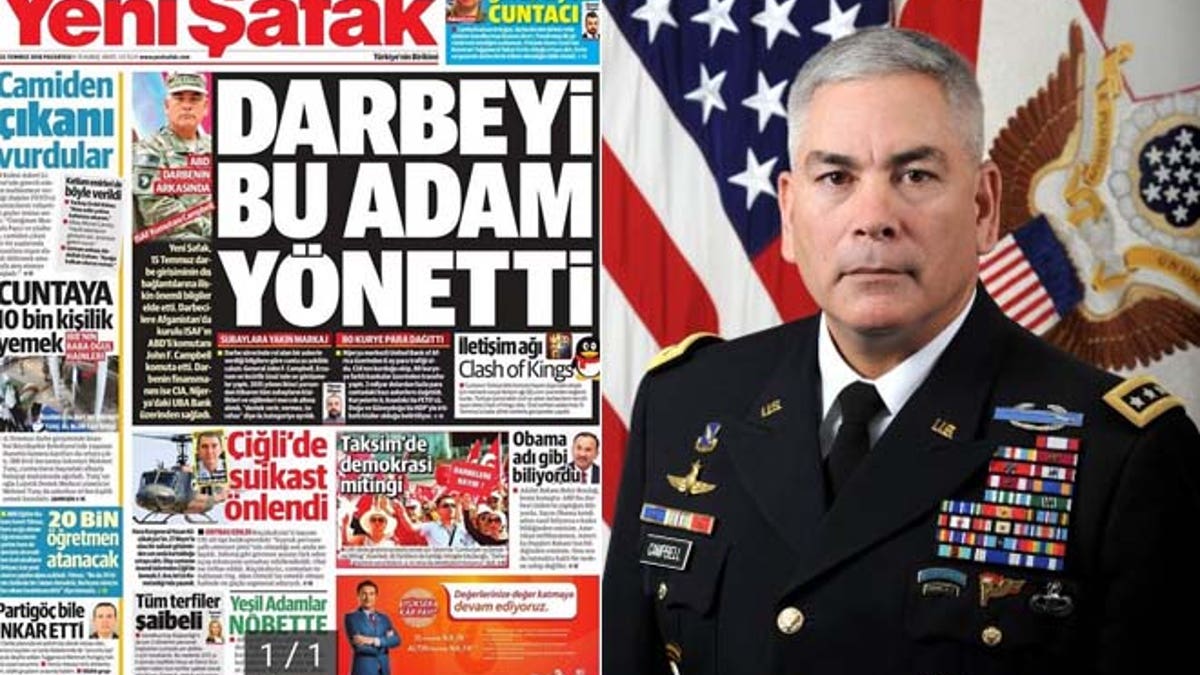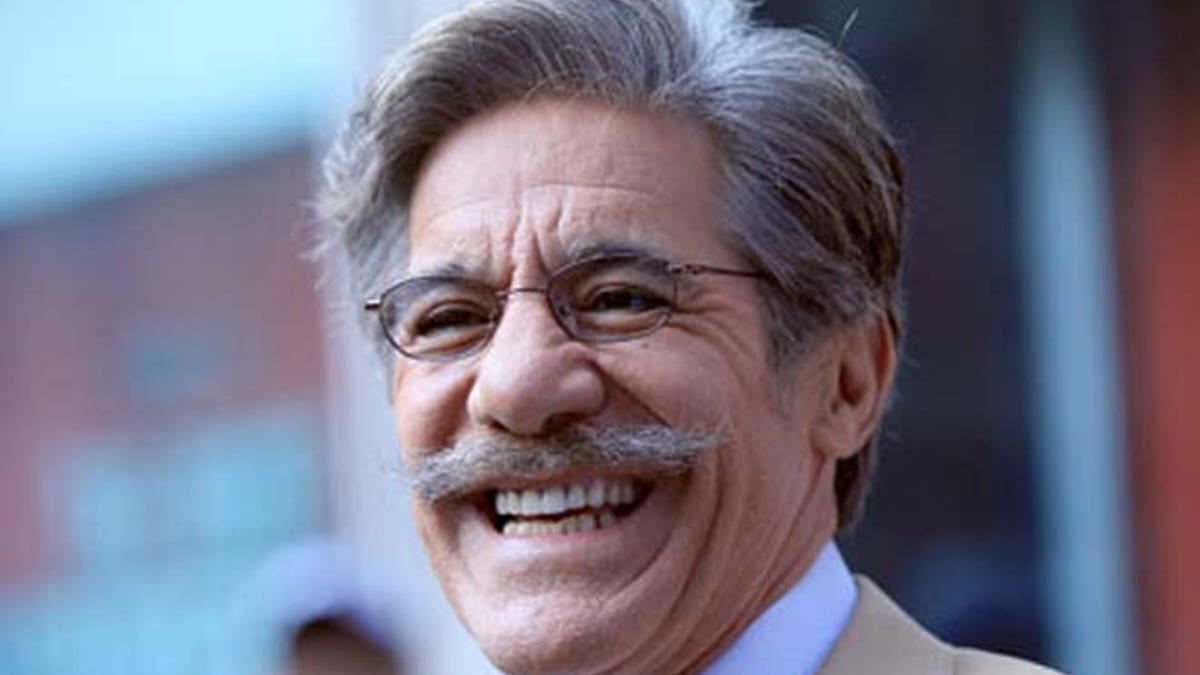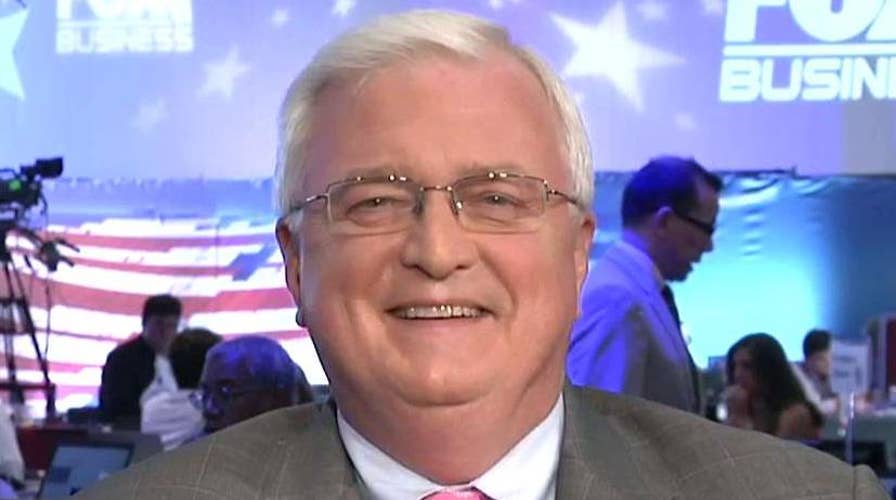Van Hipp: Turkey had been festering, but Obama admin asleep
Defcon 3: KT McFarland and Van Hipp discuss the situation in Turkey, NATO and how a President Donald Trump will change America's foreign policy
The retired U.S. Army general and former NATO commander accused of masterminding the recent failed coup in Turkey has an alibi -- he was having a beer with Fox News Channel's Geraldo Rivera.
Yeni Safak, a Turkish tabloid known as friendly to the increasingly authoritarian regime in Ankara, hit newsstands Monday with a front-page blaring in Turkish “This man led the coup,” alongside a picture of U.S. Army Gen. J.F. Campbell.
It was news to Campbell, who retired in May after a distinguished, 37-year career that saw him most recently serve in both the Afghanistan and Iraq wars. Campbell served as commander of the NATO International Security Assistance Force from August 2014 to earlier this year.

Blaming Gen. Campbell for the failed coup takes Turkey's anti-American rhetoric to a dangerous new level, say experts.
"I haven't traveled outside the U.S. since I came back from Afghanistan in March," Campbell told FoxNews.com. "I have no idea why they picked me for this headline.
"In fact, on the day of the coup I think I was in New York City with Geraldo having a beer," he added.
The newsman corroborated the general's claim.
@ahmetsyayla After Monday morning, there is a CONSIDERABLE risk against the Americans, US Embassy and consulates in Turkey. I advise caution
— Ahmet S Yayla (@ahmetsyayla) July 25, 2016
"I absolutely vouch for General Campbell," Rivera said. "The only thing we were overthrowing were a series of Stella Artois [beers]."
As bizarre as the claim may be, some experts said the accusation ratchets up tensions with the U.S. in a way that could put Americans at risk. Turkish President Recep Tayyip Erdogan, who has used the coup to justify a massive crackdown on opposition, is playing a dangerous game by pointing the finger at the U.S.
“This is absolutely nuts,” said Fox News contributor and former Army Lt. Col. Ralph Peters. “Erdogan's cynical, though, and often plays the nationalist card. There's no easier target than the Americans.”

Rivera says he was bending elbows with the general when the failed coup went down.
The State Department referred requests for comment to Campbell, who said no one from the U.S. government has contacted him about the matter.
“This anti-American rhetoric reminds [me of] the '79 Iranian revolution and what happened afterward. It is a very dangerous approach,” Ahmet Yayla, former chief of counter-terrorism for the Turkish National Police and a member of the International Center for the Study of Violent Extremism, tweeted Monday.
Yayla said the irresponsible charge is part of Turkey’s self-isolation from the West in the wake of the coup attempt.
Erdogan has declared a three-month state of emergency after the failed coup and detained as many as 50,000 academics, judges, soldiers and civil servants. He has seized control of thousands of public and private institutions, rooting out all of those he suspects of sympathizing with his arch-enemy, U.S.-based cleric Fethullah Gulen.
The U.S. response to the crackdown has been muted, and Secretary of State John Kerry is considering Turkey’s demand that Gulen, who lives in a compound in the Pocono mountains of Pennsylvania, be turned over. NATO and European leaders have expressed alarm at the breadth and rapidity of the crackdown, which critics fear is an effort by Erdogan, to cement his hold on power and move the constitutionally secular nation toward an Islamist government.
Still, rumors and accusations of U.S. involvement in the coup attempt have been circulating for more than a week. Several of the fighter planes involved in bombing government facilities took off from the jointly operated Incirlik Air Base in southern Turkey, from which the U.S. conducts air strikes against the Islamic State.
President Obama told Erdogan in a telephone conversation last week that reports the U.S. was involved in the coup were “unequivocally false.” Obama also said he hoped “there is not an overreaction that could, in some fashion, lead to curtailment of civil liberties,” according to a spokesman.
Gulen, once a political ally of Erdogan, has a large following embedded throughout Turkish society and Erdogan believes he played a leading role in the coup. Gulen runs a global network of Islamist schools and charities. The United States says it will only extradite Gulen to Turkey if it receives strong evidence that he was involved in the coup.
Campbell said he has never met Gulen.








































